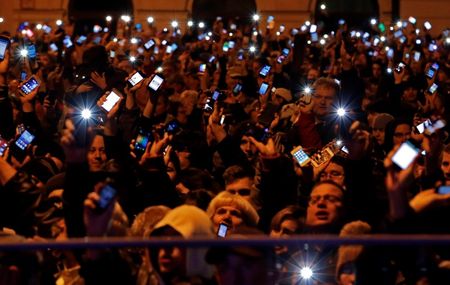BUDAPEST (Reuters) - Thousands of Hungarians protested in Budapest on Sunday against a planned new tax on Internet data transfers, which they said would not only increase the tax burden but would also curb fundamental democratic rights and freedoms.
Prime Minister Viktor Orban's government, which has been widely accused of adopting anti-democratic policies, first unveiled plans for the new tax late on Tuesday in the draft 2015 tax bill submitted to parliament.
The draft tax bill contains a provision for Internet providers to pay a tax of 150 forints (60 U.S. cents) per gigabyte of data traffic, though it would also let companies offset corporate income tax against the new levy.
The rally on Sunday was organized by a Facebook group which has over 210,000 supporters. The protesters, which some local websites estimated as numbering over 10,000, gathered in front of the Economy Ministry.
"The move... follows a wave of alarming anti-democratic measures by Orban that is pushing Hungary even further adrift from Europe," the organizers of "100,000 against the Internet tax" said in a press release.
"The measure would impede equal access to the Internet, deepening the digital divide between Hungary's lower economic groups, and limiting Internet access for cash-poor schools and universities," they added.
At one point, protesters held up their mobile phones, lighting up the square in front of the ministry. Then they walked to the city's historic Heroes Square. Some of them also went to the nearby headquarters of the ruling Fidesz party and threw outdated computer parts at the building, breaking some windows, local Internet website Index.hu reported.
The organizers gave the government 48 hours to withdraw the tax legislation and said there would be a fresh protest on Tuesday if this does not happen.
Fidesz said in a statement on Sunday that on Monday it would submit an amendment to the legislation in parliament, which would set a maximum level on the tax payable by individuals. It said monthly payments would be capped at 700 forints, and Internet providers would pay the tax.
But some protesters said the new tax was an epitome of the government's mistaken economic policies.
"This would be a double tax on us, as I have already paid a sky-high VAT when I bought the gadgets, computer and router," said Attila Sos, 43, who came to the protest with his family.
"This is a good occasion for a lot of people to come here to show that they are discontent with the government's tax and economic policies. This was only the icing on the cake."
"The Internet connects people and it should not be limited," said Krisztina Nagy, 21, who wants to be a Web programmer, and fears that companies would push the costs of the new tax onto customers.
Orban's government has in recent years imposed special taxes on the banking, retail and energy sectors as well as on telecommunications providers to keep the budget deficit in check, jeopardizing profits in some sectors of the economy and unnerving international investors.
At the same time, it has cut personal income taxes.
The Association of IT, Telecommunications and Electronics Companies has said the tax would force them to raise prices.

(Reporting by Krisztina Than; Editing by Eric Walsh)
